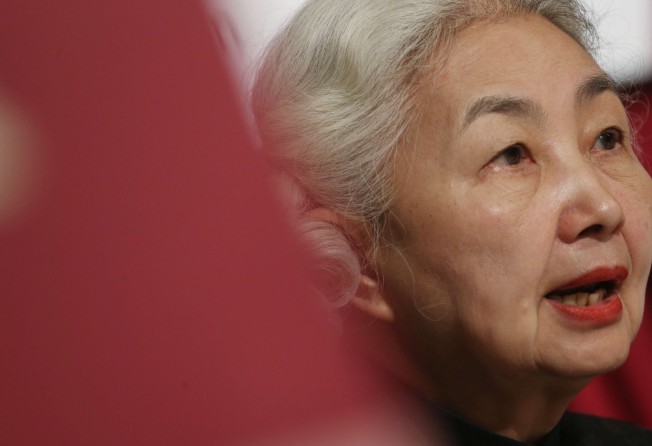Interpretation on Hong Kong independence is unnecessary, former justice minister Elsie Leung says
Elsie Leung Oi-sie chimes in on March leadership election during radio interview

With localists bent on a radical agenda among Hong Kong’s newly elected lawmakers due to be sworn in next week, a former justice minister has ruled out the need for Beijing to step in and reinterpret the Basic Law, as the city has enough legal firepower under its mini-constitution to take on calls for independence.
Elsie Leung Oi-sie, currently vice-chairwoman of the Basic Law Committee under the National People’s Congress Standing Committee, said it would be better to handle the issue locally than take the politically sensitive and problematic route.
“We have not seen any behaviour by the newly elected lawmakers or members of the public that renders interpretation of any Basic Law provision necessary,” Leung said in the first Legco Review show on RTHK hosted by former Legislative Council president Jasper Tsang Yok-sing.
She added: “I hope these matters can be resolved locally.”
Seven localists demanding self-determination for the city’s future were elected as lawmakers last month, with the high number of votes they secured underscoring a new wave of political thinking among the city’s youth.
One of them, Sixtus “Baggio” Leung Chung-hang of Youngspiration, has already vowed to add the term “Hong Kong independence” in future legislative bills to broaden the scope of public discussion.
Elsie Leung’s remarks are seen as a reflection that Beijing is not considering reinterpretation as a course of action.
“Leung is authoritative and well-trusted by Beijing,” Chinese University political scientist Ivan Choy Chi-keung said. “However, the pressure is mounting on the next chief executive to enact national security legislation under Basic Law Article 23, especially as Macau has already done so.”
The government previously introduced anti-subversion legislation in 2002, but was eventually forced to shelve the plan after 500,000 people took to the streets in protest in 2003. This ultimately led to the resignation of former chief executive Tung Chee-hwa.
Localists promoting self-determination believe Hongkongers should have a say on the post-2047 political system upon the expiry of the 50-year promise to keep Hong Kong’s autonomy unchanged under the “one country, two systems” policy guaranteed by the Basic Law.
Leung said whether two systems would remain “is not the key question” as long as China continued to be the sovereign state.
When Tsang challenged her projection, pointing out that Hongkongers were concerned about being forced to embrace China’s socialist system, Leung said it would depend on what happened in the coming 30 years.
“I agree with [the call for] more powers and democracy, but not for independence or self-determination,” she said.
Pro-independence calls rose to prominence after a failed bid to implement universal suffrage in 2014. Leung called for discussion between different camps in the legislature before the government could roll out a new plan acceptable to most lawmakers.
As for the next chief executive to be chosen in March, she said it “would not be an easy job”, because apart from commitment to Beijing and Hong Kong, the right candidate would also need to be “passionate” and “do everything based on social well-being”.
Declining to elaborate on Chief Executive Leung Chun-ying’s performance, she said: “Let’s not criticise C.Y. He is [doing] his job now.”
She said “many people” would be capable of achieving social unity.